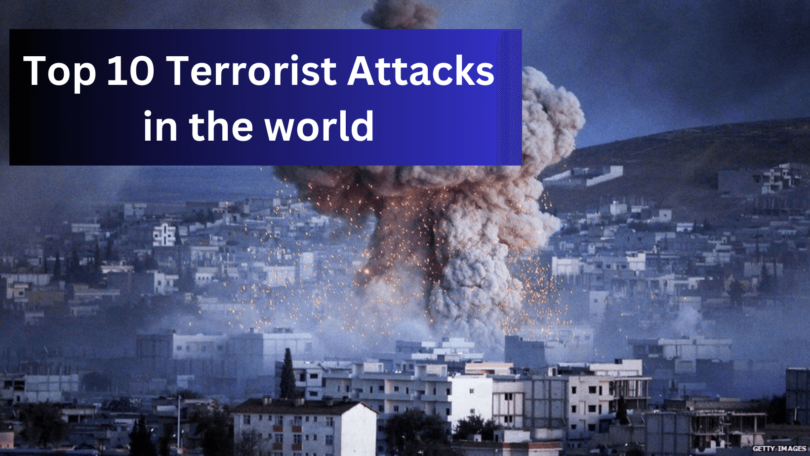This article delves into the top 10 terrorist attacks of the past decade, shedding light on the tragic events that have left an indelible mark on our world.
Terrorism is a global menace that has affected countries around the world for decades.
The impact of terrorist attacks extends far beyond the immediate loss of life and property damage, as they often leave lasting scars on communities and nations.
Terrorist Attacks in the world
1. September 11, 2001 (United States)

The September 11 attacks on the United States were a series of coordinated suicide terrorist acts by the extremist group Al-Qaeda.
These attacks involved hijacked commercial airplanes crashing into the World Trade Center in New York City, the Pentagon near Washington, D.C., and a thwarted attempt on Flight 93. Nearly 3,000 people lost their lives, making it one of the deadliest terrorist acts in history.
They led to significant changes in U.S. foreign policy, including the initiation of the War on Terror, which involved military interventions in Afghanistan and Iraq.
2. November 13, 2015 (France)

The coordinated terrorist attacks in Paris, France, on November 13, 2015, were carried out by ISIS militants.
A series of bombings and shootings across the city, including at the Bataclan concert hall, resulted in the deaths of 130 people and injured hundreds more. The attacks shocked the world and prompted an international response against ISIS.
The memory of November 13, 2015, serves as a solemn reminder of the need for continued cooperation among nations to prevent terrorism and to uphold the values of freedom and democracy in the face of such acts of violence.
3. November 26, 2008 (India)

Known as the Mumbai attacks, this three-day siege saw 10 Pakistani terrorists affiliated with Lashkar-e-Taiba carry out a series of shootings and bombings across Mumbai, India. A total of 164 people were killed, and more than 300 were injured.
The attacks began with the terrorists storming the Chhatrapati Shivaji Terminus railway station, the iconic Taj Mahal Palace Hotel, Oberoi Trident Hotel, and the Jewish community center, Chabad House.
The attacks strained relations between India and Pakistan and highlighted the need for increased counterterrorism efforts in the region.
4. April 15, 2013 (United States)

The Boston Marathon bombing was a terrorist act carried out by two brothers, Tamerlan and Dzhokhar Tsarnaev.
The blasts claimed the lives of three innocent people and left hundreds more injured, some with life-altering wounds. In the aftermath, the city of Boston and the entire nation were gripped by a sense of shock and grief.
They detonated two homemade pressure cooker bombs near the finish line of the Boston Marathon, killing three people and injuring hundreds. This attack underscored the threat posed by lone-wolf terrorists and the importance of domestic intelligence efforts.
5. July 7, 2005 (United Kingdom)

The London bombings of July 7, 2005, also known as the 7/7 attacks, involved a series of coordinated suicide bombings on London’s public transportation system.
Four suicide bombers associated with Al-Qaeda killed 52 people and injured more than 700. These attacks were a stark reminder of the persistent threat of terrorism in Western countries.
In the face of such tragedy, the resilience and unity displayed by the people of London and the UK as a whole were a testament to their determination to stand strong in the face of terrorism and uphold the values of freedom and democracy.
6. July 22, 2011 (Norway)

Anders Behring Breivik, a right-wing extremist, carried out two separate attacks in Norway on July 22, 2011.
He first detonated a bomb in Oslo, killing eight people, and later went on a shooting spree at a youth camp on the island of Utøya, where he killed 69 more people. This horrifying event served as a reminder that terrorism can come in various forms and ideologies.
In the aftermath of the attacks, Norway came together to mourn the victims and reaffirm its commitment to values of inclusivity, tolerance, and unity.
7. April 21, 2019 (Sri Lanka)

Easter Sunday bombings in Sri Lanka, orchestrated by an Islamist extremist group known as National Thowheeth Jama’ath, targeted churches and hotels.
These coordinated attacks resulted in the deaths of 269 people and injured over 500. The bombings highlighted the global reach of extremist ideologies and the need for international cooperation in combating terrorism.
These devastating attacks, carried out by suicide bombers associated with an Islamist extremist group known as National Thowheeth Jama’ath, shocked the world and left Sri Lanka in mourning.
8.November 24, 2017 (Egypt)

The attack on the Al-Rawda mosque in Egypt’s Sinai Peninsula was carried out by militants affiliated with ISIS.
The terrorists stormed the mosque during Friday prayers, killing 311 people and injuring many others. This tragedy underscored the persistent threat of terrorism in the Middle East and North Africa.
The scale and cruelty of this act underscored the ruthless tactics employed by extremist groups to sow fear and division among communities.
9. October 31, 2015 (Russia)

A bomb planted on a Russian Metrojet flight from Sharm el-Sheikh, Egypt, to St. Petersburg, Russia, exploded mid-flight, killing all 224 people on board.
ISIS claimed responsibility for the attack, which highlighted the vulnerability of commercial aviation to terrorist threats.
The incident highlighted the vulnerability of commercial aviation to terrorist threats, particularly in conflict zones and areas with lax security protocols.
10. March 15, 2019 (New Zealand)

The Christchurch mosque shootings were carried out by a white supremacist who targeted two mosques in Christchurch, New Zealand, during Friday prayers.
This hate-fueled attack resulted in the deaths of 51 people and wounded dozens more. It drew global attention to the rise of far-right extremism and the importance of combating all forms of terrorism.
The country rallied around its Muslim community, showing solidarity and support in the face of this senseless act of violence.
These top 10 terrorist attacks of the past decade serve as grim reminders of the pervasive threat of terrorism around the world.
They have prompted governments, organizations, and individuals to intensify their efforts to prevent and respond to such acts of violence. Combating terrorism requires a concerted global effort, one that addresses the root causes of extremism while upholding the principles of peace, tolerance, and unity.








